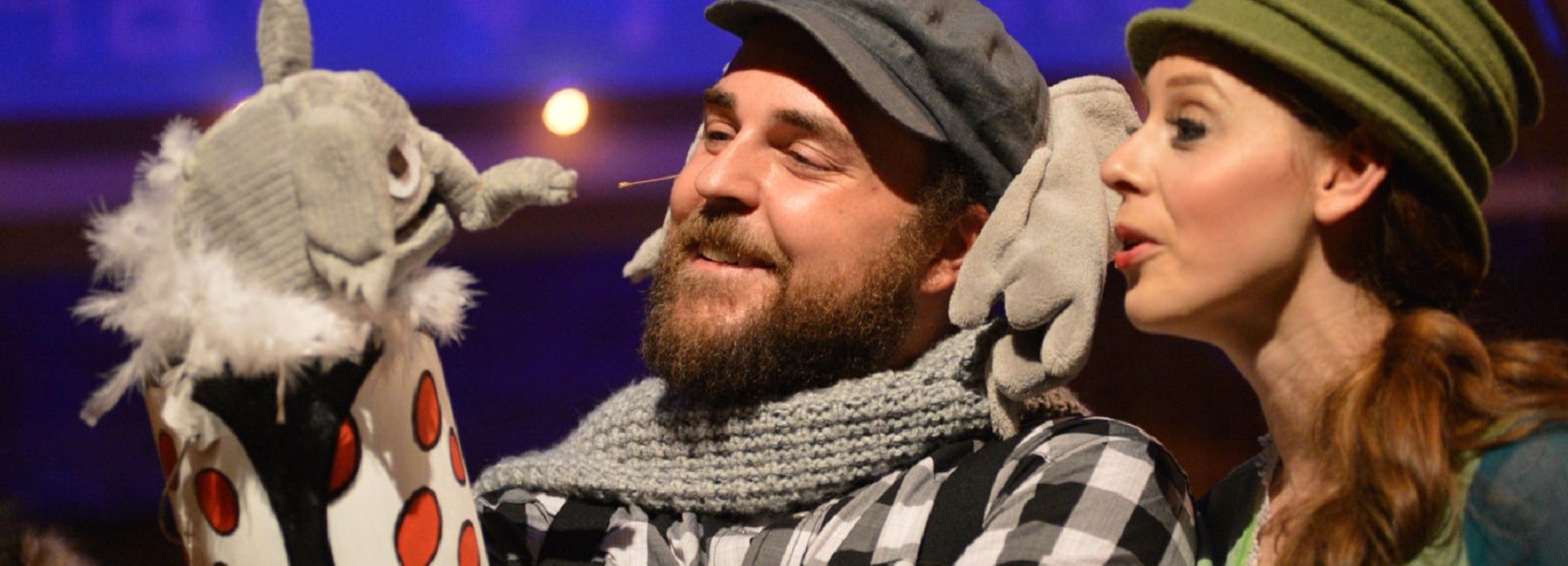Theatre artists and organizations must reimagine what the theatre can be, bending the definition to include virtual or digital offerings. So, too, do students and educators find the boundaries of educational spaces stretching and expanding. Gratefully, modern technology can provide tools that allow us to continue creating, learning, and convening in the face of adversity. For Theatre for Young Audiences and Theatre Education university students, who may feel siloed within their departments even during the most typical of times, building a virtual network also presents the potential to strengthen TYA in academia, and in turn, our field as a whole.
In October 2020, TYA and Theatre Education university faculty and students gathered virtually for “Exchange for Change,” the first TYA University Digital Connect, hosted by Emily Freeman, Director of Community Partnerships at Orlando Repertory Theatre, and Elizabeth Brendel Horn, Assistant Professor of Theatre for Young Audiences at University of Central Florida (who authored this article). This offering built upon a pre-existing partnership between Orlando REP and UCF, as MFA candidates in TYA at UCF spend two years working in education, administration, and production roles at Orlando REP. Orlando REP’s recently recorded theatrical production of Vote?, by Eric Coble, created the opportunity for UCF’s TYA students to develop virtual programs centered on the play and its themes of civic duty and voters rights. In an effort to broaden the audience base of the production, and to engage more university students in facilitating and participating in community engagement initiatives based on these themes, the TYA University Digital Connect was born.
In an effort to broaden the audience base of the production, and to engage more university students in facilitating and participating in community engagement initiatives based on these themes, the TYA University Digital Connect was born.
The objective of this event was to explore ways in which theatre can lead to dynamic community engagement and to examine facilitation strategies in a virtual platform. The weekend culminated in participants dreaming up community engagement projects inspired by Orlando REP’s production of Vote?. Projects were drafted using the “Theatrical Framework for Community Engagement” (below), a framework created by Emily and Elizabeth. The framework consists of multiple rings, all focused toward a central theme or artistic experience. As participants move through the rings, experiences closer to the center suggest a more internal/personal focus, and those in the outer rings have the greatest potential for broader community impact. In this article, the same framework will be used to offer an inside peek into the TYA University Digital Connect.
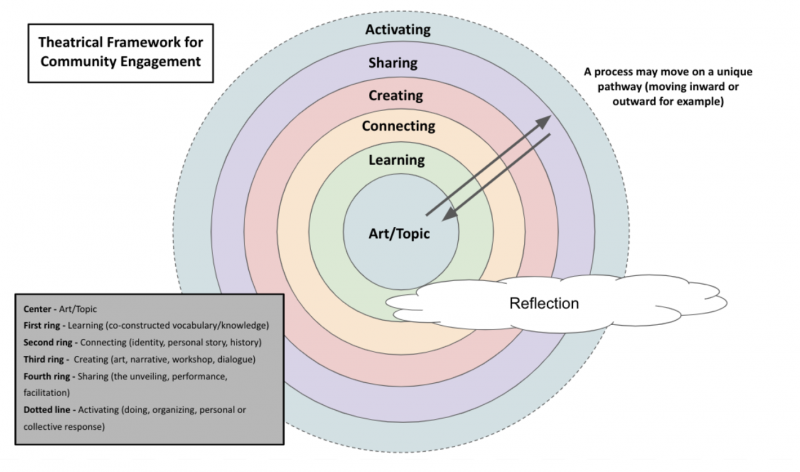
Theatrical Framework for Community Engagement. Credit: Emily Freeman and Elizabeth Brendel Horn.
Art and Topic
Orlando Repertory Theatre’s production of Vote? served as the central inspiration for our time together. Coble’s play examines American’s history of voting rights and voter suppression through the eyes of a young Black American girl, who is whisked through time and meets key historical figures. Fully produced on stage and professionally filmed and edited, all participants attending the Digital Connect were able to watch the performance in advance, and engaged in a panel discussion of directors, technicians, and actors to learn more about the process.
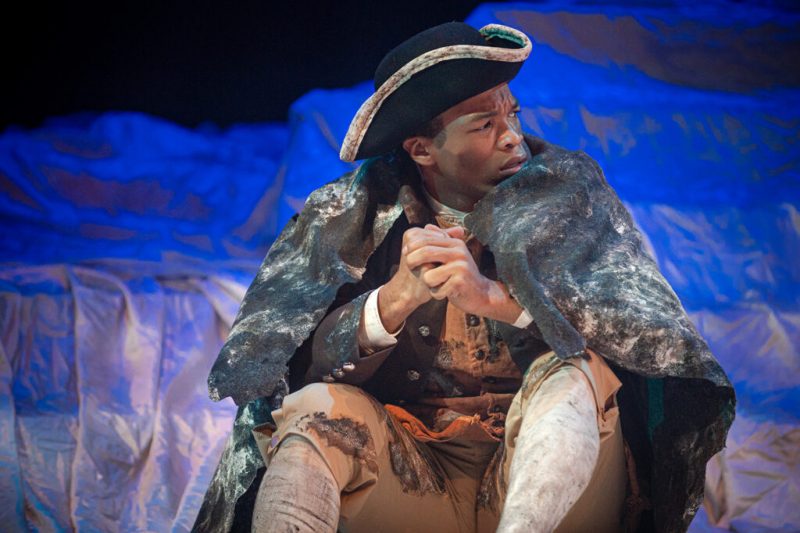
Vote? | Orlando REP. Photo Credit: McKenzie Lakey
Learning
The learning ring of the Theatrical Framework for Civic Engagement provides the opportunity for participants to co-construct knowledge based on prior knowledge and gathered information. Together, participants in the Digital Connect brainstormed favorite theatre exercises and Zoom features, and shared with one another theatre games and exercises they had experienced on digital platforms.
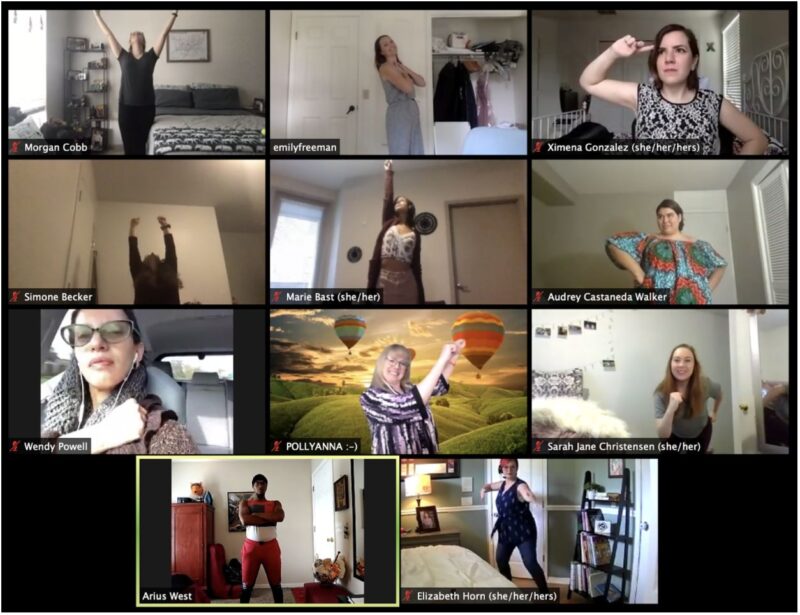
Connecting
To help participants better connect the content being explored to their personal lives and identities, participants wrote free responses to the prompts “Engaged citizenship FEELS like …” and “Engaged citizenship LOOKS like …” These responses were compiled into a word cloud, which participants were then able to annotate and respond to in chat and discussion.
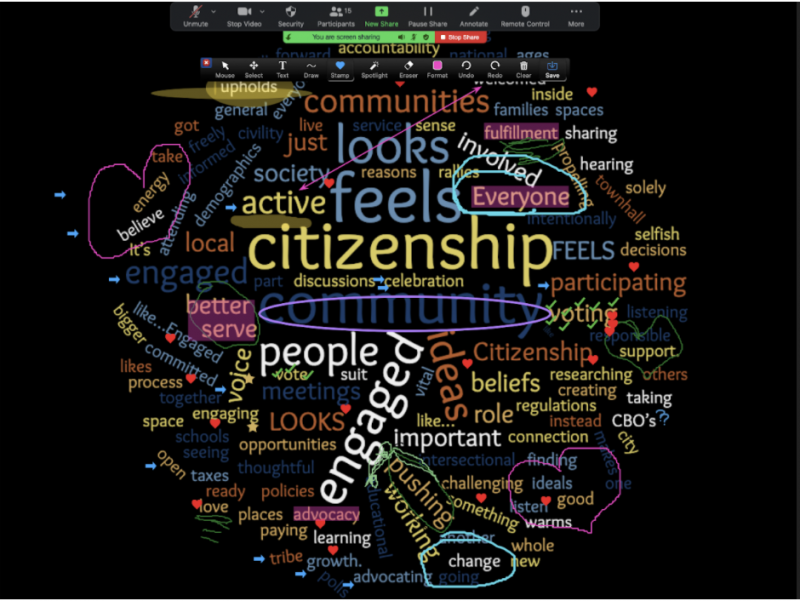
Creating
Participants then dove into playing with the Theatrical Framework for Community Engagement, using the framework to brainstorm possible elements or activities that would be incorporated into projects inspired by the themes presented in Vote?, such as citizenship, oppression, and the democratic process.
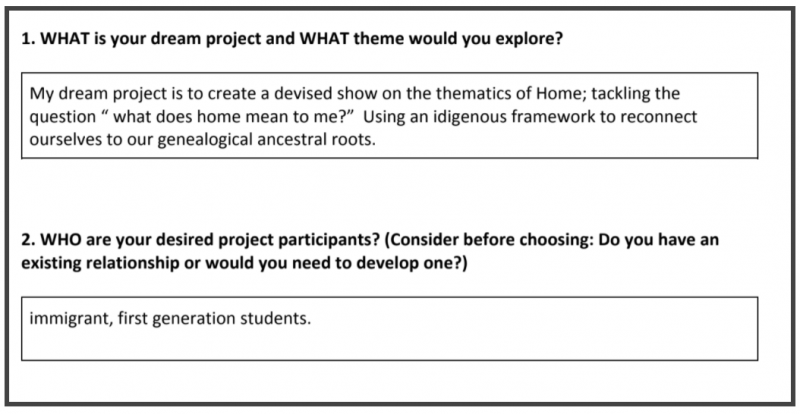
Credit: Audrey Castañeda Walker, MFA candidate in TYA at University of Hawai’i at Mānoa.
Sharing
While our short time together did not allow for completed project plans, participants shared their progress in small groups, utilizing Liz Lermon’s Critical Response Process. UCF graduate students, who had previously been working with the framework to create their own community engagement projects based on Vote?, also shared the developmental process of their diverse projects.
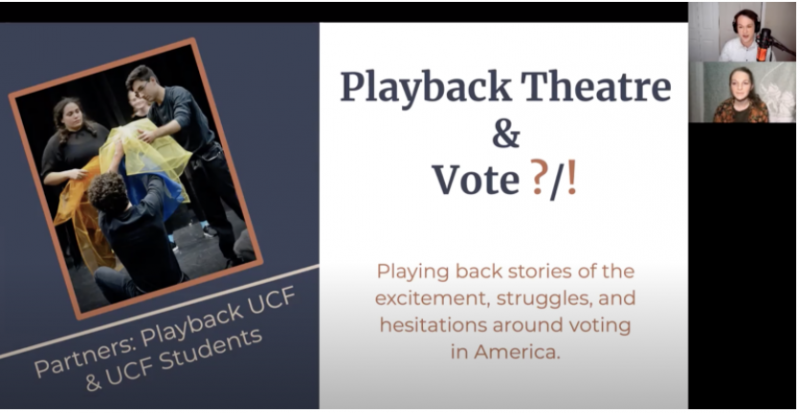
Credit: Nathan Stout and Sage Tokach, MFA candidates in TYA at University of Central Florida.
Activating
The final ring of the framework, Activating, recognizes the need to take a theatrical experience past performance, and into action. Depending on the length and purpose of a project, the Activating ring might be the central focus — such as organizing a town hall meeting. Many of our participants did express the desire to activate by implementing the projects they developed after the Digital Connect, and we look forward to seeing these projects grow. However, we acknowledge that, especially in a condensed time period, “Activating” may also be done on a smaller scale, and may be internal or individual, such as creating a personal call to action. In the image below, participants reflected on what it means to Activate an experience, and physically embodied their response.
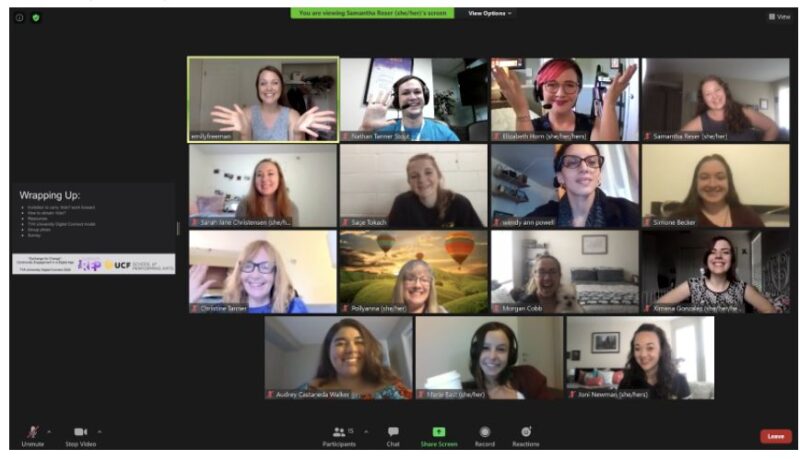
Conclusion
Reflection is represented on the Theatrical Framework for Community Engagement as a cloud — ever present and moving through all of the other rings. As a group, we reflected at multiple moments throughout our time together. As hosts, we are left feeling energized, excited, and yes, reflective, as we think back on the time we shared together, asking: Does community engagement have a clear beginning or end? If our framework is represented by circles, how is our time together cyclical in nature?
Twenty-three participants across ten different undergraduate and graduate programs participated in our first TYA University Digital Connect. Over two days, we played, dreamed, and learned together, moving across the rings of the Theatrical Framework for Community Engagement both in theory, as we dreamed up projects based on Orlando REP’s production of Vote?, and in practice during our time with one another. Following the experience, participants cited the panel discussion, breakout room discussions, demo exercises, and framework as opportunities to collectively learn as we traverse uncharted territories in an era of socially-distanced Zoom theatre and online learning. Perhaps the greatest take away from our time together, as one participant put it, was finding strength in “reaching across university boundaries to share and learn.” The TYA University Digital Connect was an opportunity that grew out of the necessities of our current circumstances, yet it served as a reminder that as a field, we are better together.
Is your institution (a professional theatre or university program) interested in hosting a TYA University Digital Connect? We would love to hear from you, and hope this model may be further developed! Please email TYA/USA board member Elizabeth Brendel Horn at Elizabeth.Horn@ucf.edu and share your ideas!

